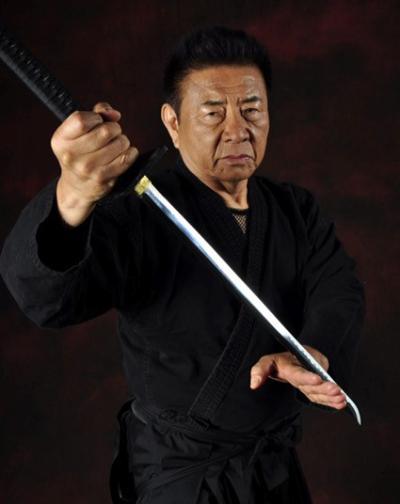
Sho Kosugi, iconic martial arts and action-movie star, told a large Loyola Marymount University audience that “hard work and never giving up” was the key to his success, in life and in his career. He spoke on March 14, 2018, as part of the Center for Asian Business Y.B. Min Lecture Series about his life’s journey and how he navigated various endeavors.
Kosugi introduced the concept of the ninja to Western audiences in the 1980s through a series of martial art movies, changing pop culture. With more than 20 movies and television features in the U.S. and Japan, Kosugi built his career as an actor, martial artist, fight choreographer, author and entrepreneur.
The Y.B. Min Lecture Series is underwritten by International Communications Foundation in Seoul, Korea, to provide a lectures and entertainment media screenings for the LMU community – students, faculty, staff and neighbors that examine the cultures and histories of East Asia and today’s challenges. The International Communication Foundation was founded in 1982 by Young Bin Min, chairman of YBM/Si-sa, a Seoul-based corporation.
Kosugi was introduced by Timothy Sieto, an LMU parent who from the age of 12 was a student of Kosugi’s. During the introduction, Sieto said that in the audience was a passionate fan who had flown in from Japan and came to LMU directly from the airport to see Kosugi’s lecture. Later in the evening, Sieto joined Kosugi on stage to demonstrate what he learned from Kosugi by being his sparring partner. The staged fight, which Kosugi choreographed and taught to Sieto on the spot, looked like a magical dance between the two skilled partners.
“There is no one else in the world like you,” Kosugi said. “You can do things others cannot and don’t think ‘he’s better than me.’ Work hard to achieve your goals and seek yourself,” advised Kosugi.
He demonstrated for the audience the “Nine Levels of Power,” which is a code of conduct or philosophy he follows. It is a part of ninjutsu training – or the way of the ninja – that he believes is the one thing that separates martial arts from other sports. He noted that it is similar to the force in “Star Wars” for Jedi knights and which may have been borrowed from ninja philosophy by the movie. The nine levels are:
- Strength of mind and body
- Direction of Energy
- Harmony with the universe
- Healing of self and others
- Premonition of Danger
- Knowing the thoughts of others
- Master of time and space
- Controlling the elements of nature
- Enlightenment.
Kosugi’s ethic of hard work springs from his upbringing and early experience. Kosugi is the son of a Japanese fisherman who grew up in a poor family and suffered from a heart condition that made breathing difficult. At the age of 5, his mother enrolled him in karate class at a local dojo hoping it would help him with his illness and it worked. By 8 years old, his health was better and he became very athletic. A less-known fact about Kosugi is that he studied baseball, along with martial arts, as a child and attended a high school that was famous for baseball. Through hard work and practice, he became such a good baseball player that he was scouted by Japanese university and professional teams.
Inspired by Bruce Lee in the “Green Hornet” (1974) movie and encouraged by his sister, Kosugi decided to move to America to pursue acting. His family borrowed the money for a one-way plane ticket and with $120 in his pocket, he came to Los Angeles in 1968 at the age of 19. He studied English and earned a bachelor’s degree in economics from Cal State Los Angeles while working several jobs, practicing martial arts and competing in tournaments. It took him 13 years of hard work being an extra and a martial arts teacher/competitor before he got is big break in “Enter the Ninja” (1981.)
The lecture was co-sponsored by Asian Pacific Student Services/Ethnic and Intercultural Services, Asian and Asian American Studies, Center for Asian Business, Center for Entrepreneurship, Office for International Students and Scholars, School of Film and Television, and William H. Hannon Library.



